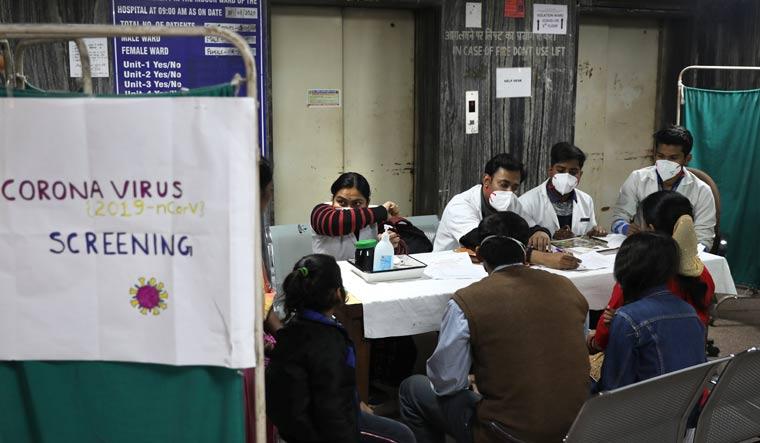COVID-19: A Reality Check of Delhi Hospitals’ Preparedness

Representational Image. Image Courtesy: AP
New Delhi: As India is unofficially the third phase of COVID-19 pandemic’s spread (community transmission), a countrywide 21-day lockdown and curfew in some states are some of the steps announced by the Centre to prevent the virus infection’s spread.
But, as far as health infrastructure is concerned, governments (both in the Centre as well as across the states — except a few) appear ill-prepared to deal with the rising number of cases (over 700) of those infected by the deadly virus.
There are complaints of poor supply of protective gears to doctors, paramedics and sanitation workers, creation of safe and secure isolation wards in hospitals, proper quarantine arrangements, supply of testing kits, procurement of ventilators, etc.
Let’s take a look at the sorry state of affairs of some hospitals in the national capital region. Many flagship hospitals in Delhi, such as Lok Nayak Jai Prakash Narayan Hospital or LNJP Hospital, Hospitals run by the Lady Hardinge Medical College and Dr. Ram Manohar Lohia Hospital or RML Hospital run by the Delhi government and the Central government, respectively, are running short of Personal Protective Equipment (PPE) — gloves, aprons, long-sleeved gowns, goggles, fluid-repellent surgical masks, face visors and respirator masks.
The hospitals have insufficient number of ventilators, which are deeply required for effectively dealing with critical patients. COVID-19 infected patients generally face extreme respiratory distress and need this device helps in artificial respiration when lungs fail to do it naturally. The Indian Council of Medical Research (ICMR), in a recent report, has estimated that around 5% of novel coronavirus patients will require intensive care and half of those will need mechanical ventilation.
A majority of city hospitals have turned their medicine and surgery wards into temporary isolation wards, postponing planned surgeries, discontinuing out-patient department (OPD) services and curtailing indoor admissions, except emergency ones
‘LACK OF BASIC PPEs, FORGET HAZMAT SUITS’
Doctors stationed in some of these hospitals have been complaining that these arrangements are not up to the mark and would not be able to address the crisis, if and when it escalates.
“Forget about PPE, the Delhi government has so far not even provided N-95 masks to its doctors, nurses, cleaning staff and guards who are involved in treating, taking samples of suspects, screening and are exposed to the waste materials,” a doctor in LNJP Hospital told Newsclick on the condition of anonymity.
The doctor said gynaecologists were provided surgical masks when the situation demands, but they should also be provided with PPE and N-95 masks. “Pregnant women have the risk of infection. ...All hospitals have insufficient supply of PPE, N-95 masks, gloves and ventilators. All doctors, nurses, sanitation workers and guards engaged in emergency services, according to WHO guidelines, should be given PPE, irrespective of the fact whether he or she is dealing with coronavirus infected patients or not, because you don’t know about the history of all patients. You have to consider everyone as corona positive, unless proved otherwise,” the doctor added.
When asked about preparedness, the concluded in one word: “Nothing.”
Another doctor in the same hospital said cancelling surgeries and turning surgery wards into isolation and COVID wards, was not a good idea.
“We are not equipped at all to deal with a catastrophe, if it happens. We don’t have new intensive care units (ICUs). The number of existing ICUs across Delhi government hospitals is insufficient to cater regular patients, forget about tackling any pandemic. New ventilators cannot be procured overnight,” the doctpr said, adding that “Many of the ventilators available in the ICUs are non-functioning. We have also not fixed the problems of MRIs in our flagship hospitals despite having technicians, which is why we have long queues.”
The doctor added that “instead of procuring MRI machines, the government has come up with a short-cut. It is asking patients to get MRIs and other diagnostic examinations done from private facilities, saying the cost will be borne by the government. This is how health infrastructures are not improved. We need to have everything in our hospitals. If any device is malfunctioning, get it fixed or replace it.”
A visibly angry doctor at the hospital’s gynaecology department said the government was talking about quarantine “but if you want to check the reality, go to the labour room of LNJP. You will realise the preparedness. All of us are scared. We cannot treat patients in such an atmosphere. It is we who face high risk of infection as we are in direct contact with infected patients,” adding that the government was doing nothing except paying lip service to healthcare personnel.
The doctor said while it was extremely important to flatten the curve of the infection’s spread by asking people to stay at home, the fact is that “there is no healthcare infrastructure in the country and the government knows that well.”
Though the government is claiming that its hospitals are well-equipped and there are dedicated COVID, isolation and quarantine wards, doctors stationed in these wards level serious allegations that many hospitals in were not testing patients because of lack of testing kits and safety gears. Very few hospitals have only just begun testing patients while some have stopped citing various reasons.
“Testings are not available in many hospitals right now. Here (at LNJP) we have started yesterday (March 26) only. Since RML Hospital has run short of kits, it has stopped testing. Lady Hardinge Medical College Hospitals too have started testing very recently, but we are not sure for how long they will continue, given the limited supply of testing of kits,” said a doctor deputed at a COVID ward at LNJP.
ISOLATION WARDS NOT REALLY ISOLATED
The doctor alleged that isolation wards in many hospitals were not so isolated. Several hospitals had dedicated a floor or two for such wards, but the pathways to these was common for all patients.
“All the suspected cases are first admitted in the emergency ward. When they test positive, they are shifted to the isolation ward. This increases the risk of infection for all those who tested negative in the same ward. Ideally, there should be dedicated medicine emergency wards for all suspected cases, with all facilities and protection of an isolation ward. These should be completely separated from other wards,” the doctor said.
The doctor also complained about lack of safety gears.
“All the doctors who are treating COVID-19 infected patients should be given hazmat suit (hazardous materials suit, which is also known as decontamination suit that consists of an impermeable whole-body garment worn as protection against hazardous materials). Its supply is very limited. PPE is not suitable for doctors who are in direct contact with infected patients, but we have no other option but to treat patients, risking our lives. Instead of boosting our morale, we are threatened if we raise our voices”
The doctor also alleged anomalies in rosters, adding that “senior doctors who are responsible for making rosters are deputing junior doctors.”
The situation in other hospitals is pretty much the same. Doctors are overburdened as no new appointments have been made.
“We are least equipped to deal with a possible outbreak of the deadly disease. We don’t have sufficient supply of testing kit. The isolation and quarantine wards are a sham. The reality is far away from what is being said and reported in the media. All the doctors are facing risk to their lives. We lack basic protective gear, forget advanced protection equipment. The hospital has limited number of ventilators and ICUs. In a nutshell, everything has been left to God. Therefore, we are appealing people with folded hands to stay indoors for your and ours safety,” said two doctors at RML Hospital.
‘POLICE MISBEHAVING WITH DOCTORS’
Many doctors Newsclick spoke to were critical about police behaviour. “Beating people and flexing muscles all the time is not going to help. Those who are coming out, need to be educated and dealt with politely. It is ironical that even doctors are not being spared,” said a doctor.
At least two doctors from LHMC and LNJP hospitals alleged that the police misbehaved with them when they were going for duty. “Since LNJP is close to my residence, I do not use my vehicle. I use public transport. A day earlier, I was going to the hospital in a rickshaw. I was allowed to move ahead at one check point. At second check point, a policeman hurled abuses at me even after I revealed my identity as a doctor. I showed him my identity card, but he did not budge and told me, ‘Tu nahin ja sakta aage (you cannot go ahead)’. When his senior came and checked my ID card, he allowed me to go. The same happened at the third check point. This is how the police are treating a doctor at such as time,” the doctor said.
Only Safdarjung Hospital, where several coronavirus patients are admitted, appears to be better prepared. A special space has been created in the super-specialty block of the hospital. There are eight floors in the building and the third and fourth floors have been kept specifically for COVID-19 patients.
According to Safdarjang Hospital’s Medical Superintendent, Dr Balvinder Singh, 75 beds have now been earmarked for patients and the hospital can increase it to 90 in case of emergency. “Nine beds have been put in the ICU for COVID-19 patients,” he added.
ABSENCE OF NATIONAL HEALTHCARE POLICY
Advocate Ashok Agarwal, who is known for his crusade for good schooling and health facilities accessible to the poor, rubbished the tall claims being made with regard to preparedness to fight coronavirus.
“There is no preparedness at all. The Delhi government is even unable to provide regular healthcare services to patients. They have insufficient number of ICUs in their hospitals. All OPDs have been closed. Patients who need medical attention are being kicked out in the name of corona,” he said.
He told Newsclick that the Delhi High Court had last year directed the state government to increase equipped ICU beds from 3% to 10% in their 33 hospitals. “But the order was never complied with. Except Mohalla Clinic tamasha, there is nothing substantial. Private hospitals have ICU beds ranging between 10% and 38%. The Delhi government’s hospitals have a total of 10,000 beds, of which only 400 ventilator-equipped beds are in the ICUs. Of these, 52 ventilators were non-functional. For each ventilator, the waiting list is around 10-15 patients in every hospital, with the number growing year after year,” he alleged, referring to an affidavit filed by the government in response to his plea in High Court.
The number of ventilators is expected to rise as 15 government hospitals have initiated the process to procure 63 ventilators.
Agarwal said the situation was more or less same across the state, except in a few hospitals, blaming this on the absence of a clear national policy for healthcare.
“The central government never declared health as a fundamental right. It has so far not been put in the Concurrent List. There was a need for a national law. In its draft policy for healthcare, the government had promised that health will be included in Concurrent List like Right to Education. But in the final draft, this proposal was dropped. Until the government declares healthcare a fundamental right, things will never improve,” Agarwal added.
Get the latest reports & analysis with people's perspective on Protests, movements & deep analytical videos, discussions of the current affairs in your Telegram app. Subscribe to NewsClick's Telegram channel & get Real-Time updates on stories, as they get published on our website.
























